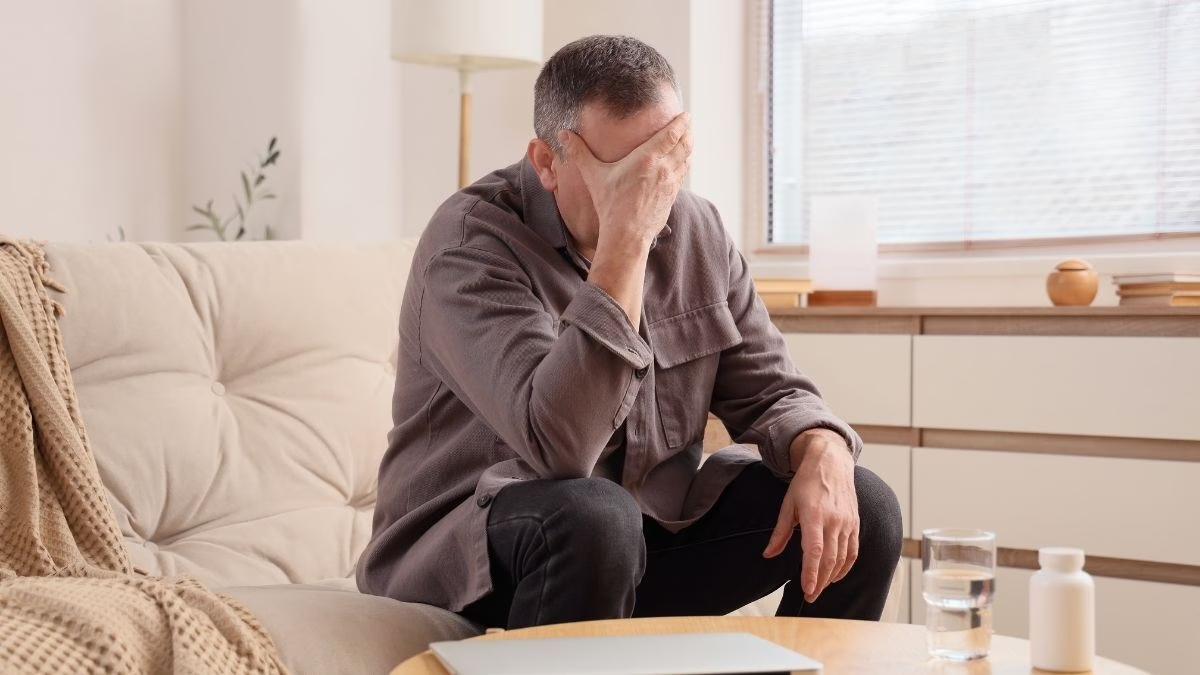Every relationship has seasons. Some feel light and effortless - others feel like trudging through mud with one shoe on. When things feel heavy or tense, it can be hard to see clearly - especially when you're in the thick of it. How do you know if it's just a rough patch or if you’re growing apart?
- Rough patches are common and often reflect stress or life changes, not the end of the relationship. Ongoing effort and care usually signal something worth rebuilding.
- Clear sources of conflict and shared values suggest the bond is still intact. Many challenges come from circumstances and patterns rather than incompatibility.
- Certain signs point to deeper problems. Contempt, refusal to grow, or relief at the idea of leaving may require more serious reflection and change.
- Reconnection starts with small intentional actions. Curiosity, appreciation, and simple moments of care help restore emotional closeness over time.
- Outside support can help when couples feel stuck. Guided conversations and practical tools make it easier to repair communication and rebuild connection.
If you’re asking yourself, “Is this normal?” or “Should love feel this hard?”, you’re not alone. Wondering how much conflict is normal in a relationship is common. Relationships change over time, and it’s easy to mistake distance or frustration for incompatibility. However, not all disconnection means it’s the end of the relationship.
Let’s talk about how to tell the difference, and ways to get through a rough patch in a relationship.
1. You’re Still Trying (Even If It’s Messy)
Maybe the conversations feel repetitive, or the tension has been lingering longer than you'd like, but you're both still engaged in the relationship in your own way. One of you might shut down during conflict or struggle to put feelings into words. Still, there’s effort being made: a quick text to check in during the day, making their coffee in the morning, sitting beside them on the couch even when words are hard to find. That effort counts.
Why it’s a sign of a rough patch: Disconnection isn’t always loud. Even small signs of care - offering a blanket when they’re cold, bringing home their favorite snack, staying in the same room instead of walking away—can mean there’s still something to rebuild. Most couples don’t break because they argue; they break when they stop trying altogether.
2. The Conflict Has a Clear Source
You're not butting heads because you’re incompatible—you’re navigating stress. Maybe it’s parenting challenges, financial pressure, health struggles, or just years of built-up miscommunication. You can point to the “why,” even though it feels hard.
Why it’s a sign of a rough patch: When conflict stems from situational or solvable patterns, not fundamental mismatches, it’s usually something that can be worked through with support, patience, and time. These challenges may feel big in the moment, but they don’t define the relationship - they reflect the stress around it, not the bond beneath it.
3. You Miss the Connection
Even in the thick of it, you catch moments where you miss how you used to connect. Maybe it’s their sense of humor, the comfort of their presence, or the way things felt when you were more in sync. It might not be a big, dramatic ache, but instead a small pull toward wanting to feel close again.
Why it’s a sign of a rough patch:
Missing your partner doesn’t automatically mean the relationship is right—it means the connection still matters to you. In long-term relationships, emotional closeness often comes in waves. If you find yourself wishing for more warmth or reaching for moments of ease between you, that can be a sign there’s still something worth nurturing. That quiet pull isn’t just about the past—it’s often your heart reminding you what you hope to feel again.
4. You Share Core Values
Maybe one of you recharges alone while the other feels energized by being around people. Maybe you disagree on daily routines or how to spend your weekends. But underneath those differences, there’s a deeper alignment. Shared values go beyond similar interests or personality traits; they reflect how you treat each other, what you believe a relationship should offer, and the kind of life you want to build together. When that foundation is strong, the surface-level disagreements can feel more manageable.
Why it’s a sign of a rough patch:
Core values act as the compass of a relationship, and while what counts as a “core value” is different for every couple, the key is that yours still align. Whether that’s honesty, loyalty, emotional support, or building a certain kind of life together, shared values provide stability during uncertain times. When you still want the same things, even if you disagree on how to get there, it usually means the tension isn’t about who you are at your core. It’s about how you’re navigating life together. And that’s something you can work on.
5. You Can Picture a Future Together (Even If It Needs Work)
Even through the hard stuff, when you look ahead—to family milestones, aging together, or building something new—you still imagine them by your side. Maybe you're unsure how you'll get there, but deep down, you want to try.
Why it’s a sign of a rough patch: That vision of a shared future is a powerful indicator of ongoing emotional investment. It means you're not emotionally checked out—you still care about what happens next, and you’re willing to imagine working through the hard parts together. Even if the present feels shaky, the hope of rebuilding signals that you see this relationship as worth the effort. It’s less about having all the answers and more about still wanting to find them, together.
When It Might Be More Than a Rough Patch
Some issues run deeper than stress or miscommunication. If you find yourselves stuck in ongoing tension that centers around fundamental differences - like whether to have kids or what commitment looks like - it might not be just a phase. These types of core conflicts can point to an underlying incompatibility that no amount of compromise can fully resolve.
Here are some signs it could be more than a rough patch in a relationship:
- Contempt or disgust has crept in. When eye rolls, sarcasm, or subtle put-downs become the norm, it often signals deep emotional disconnect. Contempt is one of the strongest predictors of divorce, according to decades of research by Drs. John and Julie Gottman.
- One partner is unwilling to take responsibility or grow. Healthy relationships require mutual effort. If one of you is doing all the emotional heavy lifting while the other refuses to reflect, apologize, or change hurtful behavior, the dynamic can become unsustainable.
- The emotional disconnection feels permanent, not temporary. All couples go through phases of distance, but if it feels like your partner has become a stranger and you can't remember the last time you felt emotionally safe together, the bond may be beyond repair.
- You feel more relief than sadness when you imagine it ending. Daydreaming about life post-breakup doesn’t automatically mean the relationship is doomed. But if those thoughts bring a sense of freedom instead of grief, it may be your intuition trying to tell you something important.
These signs don’t necessarily mean the relationship has to end, but they are signals that deeper work is needed, and that staying together might require significant change from both sides.
How to Reconnect When It Is a Rough Patch
If you’ve taken an honest look and feel like the love is still there—just buried under the stress of life, miscommunication, or emotional fatigue—there’s a path forward. Reconnection doesn’t happen overnight, but small, intentional shifts can begin to thaw even the iciest stretches.
Here’s what rebuilding might look like:
- Start with curiosity, not blame. Curiosity helps lower defenses and invites your partner into a conversation instead of a confrontation. It shifts the tone from accusation to exploration - so you’re working together, not against each other. Instead of leading with, “Why don’t you care anymore?” try something like, “What’s been hard for you lately in our relationship?” This kind of open-ended question can create space for an honest conversation without triggering defensiveness, because it focuses on understanding rather than assigning fault. Then, really listen—without interrupting or planning your next point. Often, just feeling heard can be healing in itself.
- Focus on one thing at a time. It’s tempting to try to fix everything all at once, but that usually leads to overwhelm. Choose one small point of reconnection to begin with—maybe it’s bringing back your evening walk, making time for check-ins after work, or planning one lighthearted date night. Reconnection is built moment by moment, not by solving the entire puzzle in one sitting.
- Show them you still care. When things feel off, it’s easy to go cold or shut down. But even a small gesture, such as a shared joke, a long hug, or a text that says, “I’m thinking of you," can signal you're still in it. These gestures might seem insignificant, but they can help ease tension between you and your partner and remind you both there’s still something worth working on.
- Acknowledge the good, even when it’s hard. When things feel tense, it’s easy to only see what’s going wrong. Try noticing and sharing with your partner what you appreciate. This could look like: "Thanks for doing the dishes.” or “I noticed how patient you were with the kids today.” If it feels hard to find something to appreciate, ask yourself: “What would I miss if they stopped doing it?” When we share appreciation, we can break the cycle of negativity and start rebuilding a sense of connection.
- Consider outside support. Sometimes, we hit a point where we can’t sort it all out on our own, and that’s okay. Speaking to an expert can help guide you through hard conversations without taking sides, offer practical strategies for working through stuck points, and introduce communication tools for couples that make it easier to reconnect and feel heard. It’s not a sign of failure - it’s a sign that the relationship matters enough to invest in.
Final Thought
Rough patches in relationships can feel scary, but they’re also invitations. Invitations to slow down, re-evaluate, and re-learn how to love each other in new ways.
If you’re here, that means something. You care enough to ask the question, and that alone says a lot about what makes a relationship work. It’s a good place to start.
Feeling stuck? Explore how OurRitual can help you reconnect and move forward, together. Learn more here.























